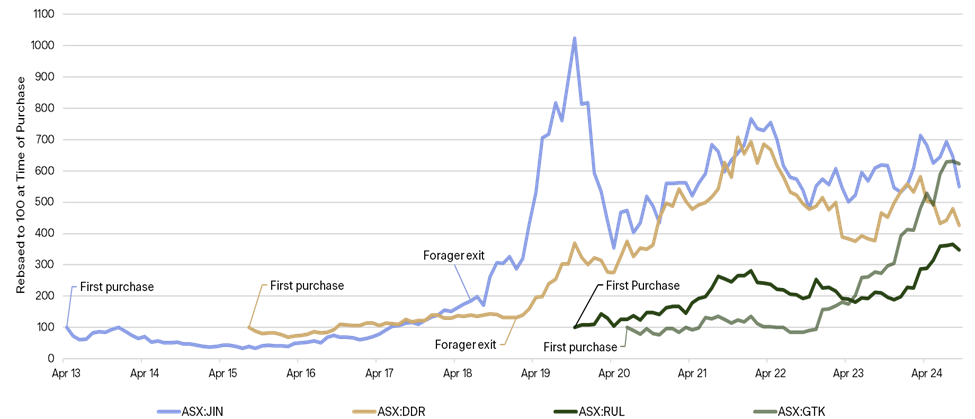The art of portfolio management
In Forager's 15 years, I've learnt flexibility is critical to portfolio management. In the last few years in particular, markets have thrown up a range of unexpected scenarios requiring portfolio managers to reflect and adjust. In this wire, I'll explore some of those lessons and adjustments I've made in recent years.
Quality, profit-taking and risk management
At the end of 2019, Forager was emerging from two very difficult years of investor returns.
Having a better mix of businesses in both Fund portfolios, and maximising profits where our thesis played out, were key changes I identified that we needed to improve on.
Firstly, I wanted to get back to owning some better quality businesses. While the likes of ARB (ASX: ARB) and Sydney Airport (SYD) did very well for our Australian Fund in the early years, by the end of the first decade we had drifted into a portfolio of almost exclusively deeply distressed businesses.
“The big returns are still going to come from small, unloved and contrarian ideas. But there’s nothing wrong with higher quality, reasonably priced investments while we wait for those ideas to present themselves.”—December 2019 Quarterly Report.
There will always be a place for unloved stocks within Forager’s philosophy, and we have made investments in a few in both funds recently. But a better balance has been of enormous benefit to both portfolios.
These better quality businesses have generated the bulk of portfolio returns in recent years. Blancco (LON:BLTG), Norbit (NORBT.OL), Celsius (NASDAQ: CELH), APi (NASDAQ: API), Gentrack (ASX: GTK) and RPMGlobal (ASX: RUL) are all examples of companies that have seen healthy revenue and profit growth translate to the funds making more than three times their initial investments.
Secondly, we have done a much better job of maximising our profits from those where our thesis has played out. Gentrack and RPMGlobal, two Australian Fund holdings bought when their value was less than $200 million and traded volumes were tiny, have seen share price appreciation rewarded with inclusion in the ASX 300 index. CRH (NYSE: CRH), Ferguson (NYSE: FERG) and Flutter (NYSE:FLUT), three International Fund investments, are on the verge of potential inclusion in the S&P 500.
That we still own all four of them is a result of an intentional effort to recognise when we are on a winner and make the most of it. Two early Australian Fund investments, Dicker Data (ASX: DDR) and Jumbo Interactive (ASX: JIN), are also in the ASX 300 today. We left a lot of money on the table by exiting too early. It is never going to be perfect, but we have done a much better job in recent years.
Leaving less on the table

One area we didn’t get right was risk management. The 2022 financial year is a blight on the past five years. We gave back far too much of 2021’s outstanding profits and ensuring that doesn’t happen again has been our primary concern and goal over the past few years.
A confidence beating
When working for Intelligent Investor in my mid-20s, we received a letter from a client. She wrote I have never met you, but I know you are young and male. Only young males could be that confident. Sexist? Yes. Accurate? Perhaps.
At 46 years old, I’ve had most of my overconfidence beaten out of me by the market. We are trying to predict the future and, as one of my good friend’s father puts it, “When it comes to the future, you just don’t know…”. He places those three dots at the end of most of his opinions and I love it as a philosophy. It’s a view as things stand, but the sentence is not finished.
The best we can do is take a sensible probabilistic view of the future and wait for the market to give us opportunities where those probabilities are heavily skewed in our favour. Things are still going to go wrong.
For that reason, we need to be careful about the proportion of Fund investments we have exposed to lady luck going against us. This is not an attempt to minimise share price volatility. Passive or ETF funds are now more than 50% of the market in the US and are getting close to that in Australia. The number of options for people to punt on the latest trends has proliferated. If you want to bet on artificial intelligence or cybersecurity, there’s an ETF for you. When the money floods in, share prices of everything included in the relevant index rise. When it recedes, everything falls in sync. That volatility is not a risk for us long-term investors. It is an opportunity.
Our risk is that we get the intrinsic value of a company wrong and that it ends up being worth significantly less than our investment price. That has happened often enough over the past 15 years to confirm that valuation is an inexact science and strange things happen in the world.
To manage uncertainty in our portfolios, we use limits on portfolio liquidity, sector, country and currency exposures reflecting the current environment. We also reserve the bazooka for situations where we believe the risk of a significant valuation error is low. We wait for the investment thesis to have more certainty before investing, even though this may increase the average purchase price of an investment. It can help mitigate the impact of inevitable mistakes.
This is an excerpt from the Forager Funds September 2024 quarterly report
9 stocks mentioned
.jpg)
.jpg)